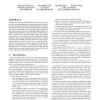63 search results - page 7 / 13 » Vulnerabilities in Anonymous Credential Systems |
TISSEC
2010
13 years 5 months ago
2010
Several credential systems have been proposed in which users can authenticate to service providers anonymously. Since anonymity can give users the license to misbehave, some varia...
FMICS
2010
Springer
13 years 12 months ago
2010
Springer
Identity Mixer is an anonymous credential system developed at IBM that allows users for instance to prove that they are over 18 years old without revealing their name or birthdate....
COMSNETS
2012
12 years 6 months ago
2012
Anonymity is one of the main virtues of the Internet, as it protects privacy and enables users to express opinions more freely. However, anonymity hinders the assessment of the ve...
PERCOM
2005
ACM
14 years 10 months ago
2005
ACM
In a set of distributed wireless networks, such as globally distributed cellular systems, different networks could be administered by different operators. Mobile devices subscribe...
ACSW
2007
14 years 10 days ago
2007
Low latency anonymous network systems, such as Tor, were considered secure against timing attacks when the threat model does not include a global adversary. In this threat model t...

